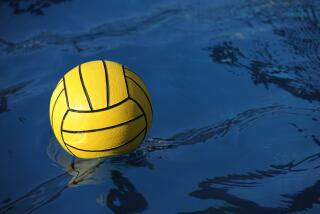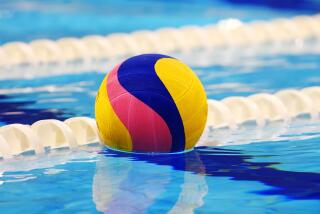Aussie Making Waves in Water Polo : Colleges: Geoffrey Clark is considered by some observers to be the top collegiate player. He has helped Pepperdine to the nation’s No. 5 ranking.
- Share via
Geoffrey Clark, a Pepperdine University water polo standout from Australia, doesn’t have a car and hasn’t seen much of the United States. Because water polo and study take up most of his time, the only traveling he’s done has been to Disneyland a couple of times and on a brief trip to the mountains.
Coaches of opposing American college teams, however, have seen all they want of Clark--although he is only in his second season with the Waves.
Last year he led Pepperdine with 90 goals--23% of the team’s scoring--and was named an All-American by the American Water Polo Coaches Assn. as well as the Big West Conference Player of the Year.
Without Clark, the Waves stumbled to an 8-17 record in 1988. With him in 1989, Pepperdine tied Cal State Long Beach and UC Irvine for first place in the Big West, came in fourth at the NCAA championships and finished 24-8.
Clark, a 6-foot-7, 205-pound junior from Sydney, couldn’t play for Pepperdine in 1988 because he had other commitments. A member of the Australian national team since he was 16, he competed in the Seoul Olympics.
He couldn’t play for the Waves in his freshman year of 1987 because he hadn’t taken the Scholastic Aptitude Test before entering college. He said his first grade-point average at Pepperdine was a 1.5 (on a 4-point scale).
Pepperdine Coach Terry Schroeder said Clark’s poor performance in the classroom was partly a result of his not being allowed to play during his freshman year.
Clark said he has raised his GPA to 3.1. He is majoring in biology and wants to pursue a career in sports medicine, either as a physician or as a researcher in exercise physiology or biomechanics.
He said that he came to America almost as a lark after he was recruited by Schroeder, the former Wave who was captain of the U.S. national team from 1983 through 1988. Schroeder, who led the U.S. team to second-place finishes in the 1984 and 1988 Olympics, had played against Clark.
Schroeder said he noticed that Clark, who plays the two-meter or hole position, “had great size and tremendous swimming speed. He could probably go to the Olympics for Australia in swimming.
“He had such raw physical talent at two meters (a position similar to a center in basketball), and he had only been playing water polo for a few years and just a few months with the (Australian) national team. I thought he was an incredible two-meter man. This was a guy I thought could be one of the best in the world if he really worked at it and wanted to do that.”
Clark may have been willing to work on his water polo at Pepperdine, but said that he didn’t work much on his studies during his first semester.
“I had the usual view of America as ‘Animal House’ (the comic film about a hell-raising American college fraternity),” he said. But he soon learned that there was more to college than having fun.
Clark, 21, was having fun with the Waves in a match with UC Santa Barbara this season until he broke a finger on his right hand. One of his teammates threw him the ball, but he lost sight of it when someone splashed the water in front of him. The hard pass hit him on the tip of his finger and broke it.
It was fortunate that the ball didn’t hit him on his left, or shooting, hand. Though in pain, he continued to play against Santa Barbara--and scored seven goals in the match, six after his injury. But he missed several games after the injury was diagnosed.
He had fun when Pepperdine surprised top-ranked California, 12-11, although he missed the last three minutes of the match after he fouled out. Clark said he thinks that Cal “did not expect us to be any good, had no respect for our abilities--so we beat them. I guess they’ll have respect for us the next time.”
When Clark was sidelined with his broken finger, sophomore Henry Rabello of Brazil took over the scoring leadership. Rabello has 75 goals, but Clark is pushing him with 68.
Clark’s scoring prowess has caused opposing defenses to key on him.
“Most teams drop back their defenses, which kind of prevents me from getting the ball,” he said. “It’s the water polo version of a zone defense, and sometimes I sit there and watch everyone else play.
“It doesn’t get too frustrating, unless the rest of our team is not scoring. It doesn’t really bother me who scores, if someone else does--and we win.”
Pepperdine, ranked fifth nationally last week in the American College Water Polo Coaches poll, is 19-8 overall and 8-1 and in first place in the Big West Conference. It has won 13 of 14 matches. Last week Pepperdine swept conference matches from Fresno State, Pacific and UC Irvine.
Clark thinks the Waves have jelled and have a good chance of winning the NCAA championships, which will be held Nov. 23-24 in Long Beach.
“We’re a good, strong team, if we pretty much play to our potential as we have in the past,” Clark said. “When some guys aren’t firing we have other guys who step forward and take up the slack.”
Some people regard Clark as the best player in American collegiate water polo. Schroeder said that some “might argue that Chris Humbert of UC Berkeley is right there too.”
But Schroeder said that in Pepperdine’s upset of Cal, Clark and Humbert guarded each other and that Clark dominated the matchup by outscoring Humbert, 7-3.
Clark, however, has no use for being called No. 1. “I guess some people say I’m the best, but I don’t know,” he said. “It doesn’t matter how good you are, if you don’t have someone to throw the ball to. You need teammates.”
Clark thinks he will continue to compete in water polo for a long time.
“I’ll play probably through the 1992 Olympics, and then stop and see what I’ve got,” he said. “I might keep playing after that--I probably will. I don’t know what I’d do with all that spare time (if he weren’t playing).”


